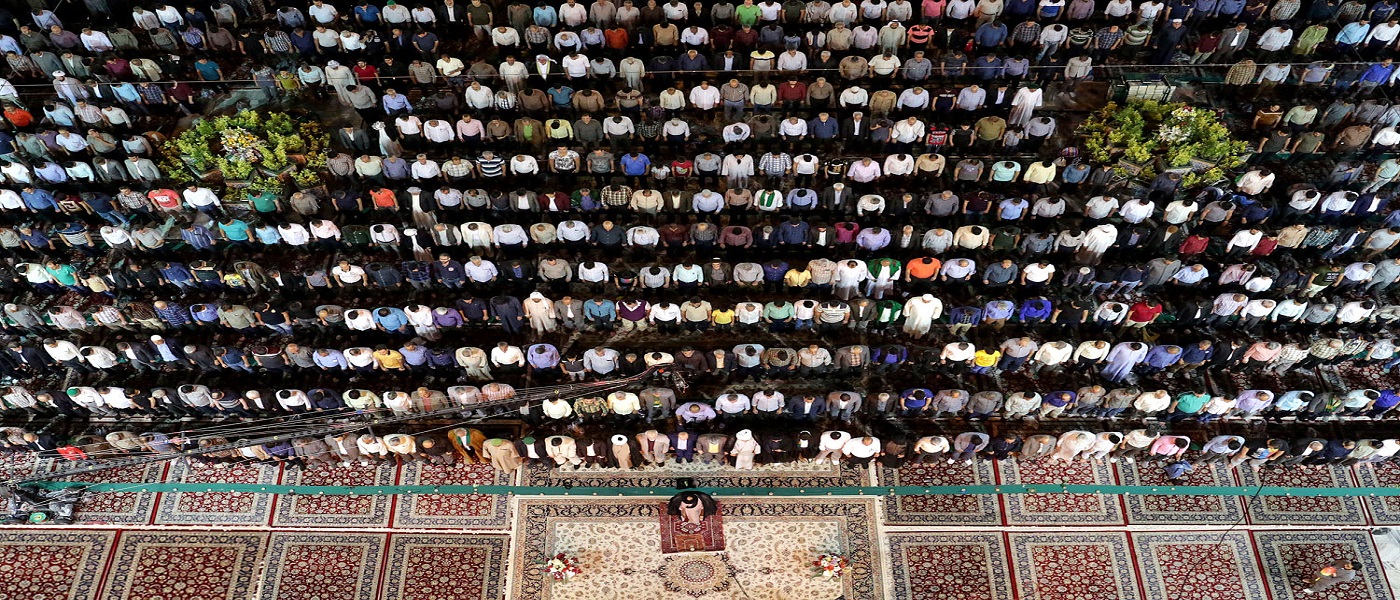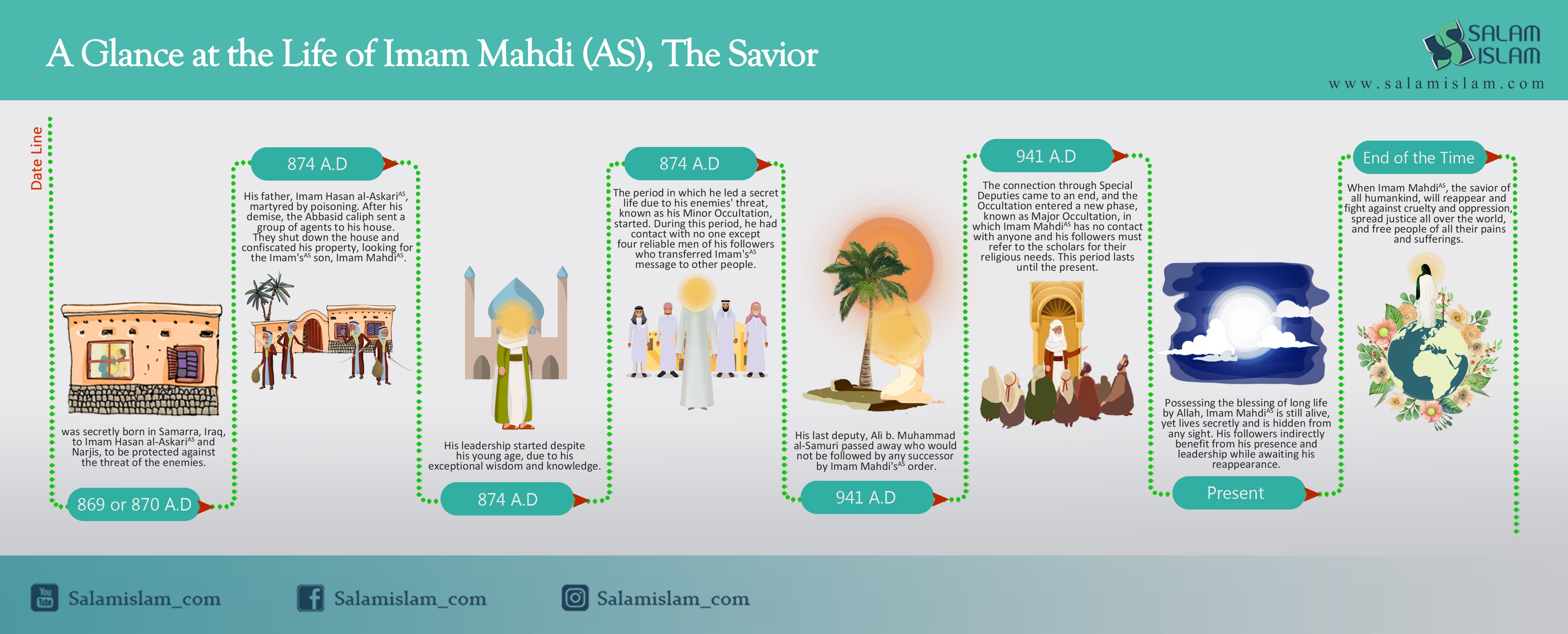

What Is Friday Prayer And How Is It Performed?
“O believers, when the proclamation is made for prayer on the Day of Congregation (Friday), hasten to God's remembrance and leave trafficking aside. That is better for you did you but know.” (62:9)
What do you think as you see a crowd of people gathered in one place, in regular rows? Acting altogether, simultaneously and in a well-organized manner? And they are dressed beautifully and smell good? Especially when they are hundreds and thousands? I see this as a glorious union. You can find this kind of forgathering in a Friday prayer.
Congregations in Islam
Islam emphasizes three congregations: Haj which is held annually in a large scale, weekly Friday prayers and daily congregational prayers. Hajj is God’s plan to bring huge amounts of people together in Mecca, to show the power of Islam and unite the Muslims; besides its specific spirituality. Imam Baghir (AS), the fifth Imam, mentions Hajj as one of the five bases on which Islam is founded. [1]
Friday prayer is of such high importance and value that when a person said to Prophet Muhammad (PBUH&HP) that he has got ready several times to go to Hajj but has not managed to, our prophet (PBUH) told him to attend Friday prayer which is Hajj of the poor. [2]
These show that Friday prayer has many characteristics of Hajj and can be influential in the same way, on a smaller scale though.
Friday
In several narrations from the last prophet (PBUH&HP) and his household, Friday is known as the best night and day of the week. It is recommended to perform full ablution (qusl), wear your best clothes, cut nails, brush your hair and beard, trim mustaches and wear perfume on this day. One of the main reasons for these recommendations is getting ready to show up among Muslims in Friday prayer.
Friday prayer (Salat al-Jumu’ah)
Friday prayer (Salat al-Jumu’ah) is an Islamic ritual. It begins with two khutbahs (orations) by Imam al-Jumu’ah in which he advises people toward observing virtue. In the first one, he elaborates on religious concepts. In the second one, he discusses political and social matters of Muslims’ community.
Then Friday prayer is performed in congregation. It consists of two rak’ahs (parts). Each rak’ah has a qunut (raising hands); in the first rak’ah before ruku’ (bowing), in the second one after ruku’. Friday prayer and the two orations before that are a substitution to the four-rak’ah Salat al-Zuhr. After that, a four-rak’ah Salat al-Asr is performed. Please note that:
- Friday prayer cannot be performed individually.
- Except for the Imam, there should be at least four people for a Friday prayer to be held. [3]
Friday prayer; obligatory or recommended?
Prophet Muhammad (PBUH&HP) says: “Surely God-may be blessed and exalted- made Friday prayer obligatory for you. If someone abandons it in my life or after my death, aiming to belittle or deny it, God will distress them and won’t bless them in their work; and know! their prayer is not accepted, and know! their alms-tax (Zakat) is not accepted; and know! their Haj is not accepted; and know! their good deed is not accepted until they repent.” [4]
In an ordinary situation, i.e. the presence of innocent Imam, Friday prayer is a determinate duty. That is the same duty should be done and it cannot be replaced by another one. But now that the twelfth and last Imam, Mahdi (AS) is absent, Friday prayer is a selective duty. Which means you can choose between performing Friday prayer or Salat al-Zuhr. [5]
Yet, considering its profits, Muslims should pay special attention to Friday prayer.
Why Is Friday Prayer Highly Recommended?
Imam Reza (AS), the eighth Imam, states the importance of Friday Prayer and its Khutbahs comprehensively: “Because Friday is a public rendezvous, khutbah on Friday has been arranged to be a means for governor to advise people and to encourage them to obedience and to warn them of disobedience and to inform them of God’s will about their interest of religion and world and let them know of what has happened to them in the world and of events in which they have disadvantage or advantage.”[6]
Reason of Repetition
- We are forgetful beings. We need to be advised repeatedly so that we may not neglect the afterlife, miss the path, and forget necessities of the society.
- See these daily and weekly prayers as the stages of a ladder. By each prayer, we should take a step upwards. By praying, we are communicating with God and by practicing in a regular program, we can enhance the quality of this communication.
References:
- Al-Kafi, v.2, p.18
- Wassail al-Shi'a, v.7, p.300
- Khamenei.ir
- Wassail al-Shi'a, v.7, p.302
- Khamenei.ir
- Wassail al-Shi'a, v.7, p.344
Share This Article

Imam Mahdi (AS) The Last Savior
Mahdi (as) is a messianic figure in Islamic eschatology who is believed to appear at the end of times to rid the world of evil and injustice. He is said to be a descendant of Prophet Muhammad (PBUH& HP) who will appear while Jesus Christ (Prophet Isa-ibni Maryam) accompanying him and will lead the believers to rule the world and fill it with justice and peace. This is what the Quran says:
And We wanted to confer favour upon those who were oppressed in the land and make them leaders and make them inheritors. (Al-Qasas 28:5)
Who is Mahdi (as)?
The name Mahdi is derived from the Arabic root h-d-y, commonly used to mean "divine guidance". Though Imam Mahdi features in both Shia and Sunni understandings of Islam, they differ in his attributes and status. Among Twelver Shi’as, Mahdi is believed to be the son of the eleventh Imam, Imam Hasan al-Askari (d. 874), and is said to have been on divine occultation (ghaybat) by God’s will. However, the Sunnis assert that he (Imam Mahdi) is a descendant of Lady Fatimah (SA), the daughter of the Prophet Muhammad, and it is unknown whether he was born or not.
What is the View of Muslims About Mahdi (as)?
According to our belief, one of the most extraordinary acts of worship is to wait for the promised saviour, and this waiting means trying to provide the conditions for his reappearance.
In the Shi'a Islam, or the school of Ahlul-Bayt, the eschatological Mahdi was commonly given the epithet al-Qa'im, which can be translated as “he who will rise”, signifying his rise against tyranny in the end of all times. Distinctively Shi'a is the notion of the temporary occultation of Imam Mahdi, whose life has been prolonged by God’s will.
As in above mentioned, the Sunnis also believe in the promised Mahdi and many hadiths about him have been narrated in their books. Abu Dawood quotes Prophet Muhammad (PBUH & HP) as saying: " Mahdi will be from my household, from the descendants of Fatimah”. And another hadith states: “Even if only one day remains [until the doomsday], God will lengthen this day until He calls forth a man from me, or from the family of my house, his name matching mine and his father's name matching that of my father. He will fill the Earth with equity and justice just as it had previously been filled with injustice and oppression”. (Furnish, 2005, p. 14) According to narrations before the arrival of Imam Mahdi, the earth would be filled with chaos. While divisions and civil wars, moral degradation, and worldliness would be prevalent among people, injustice and oppression would be rampant throughout the world. The Dajjal (The Anti-Christ) would appear and will spread decadence and corruption in the world. With an army bearing black banners, which would come to his aid from the east, Imam Mahdi would confront the Dajjal. Jesus would pray behind Imam Mahdi and then will kill the Dajjal. The Sufyani, another representative of the forces of the dark, also features in the traditions. He will rise in Syria before the appearance of Imam Mahdi. When the latter appears, the Sufyani, along with his army, will either be swallowed up en-route to Mecca by the earth by God's command or defeated by Imam Mahdi.

What Role does he have in the Future of Humanity
In Imamiyyah (Twelver Shiism), the largest Shi’a branch, believing in the messianic imam is not merely a part of the creed, but is the pivot. For the Twelver Shi'a, Imam Mahdi was born but disappeared after a while, and he would remain hidden from humanity until he reappears to bring justice to the world at the end of time, a doctrine known as the Occultation. This Imam on occultation is the twelfth imam, named Muhammad, son of the eleventh Imam, Hasan al-Askari. According to the Twelvers, the Mahdi was born in Sammara around 868, though his birth was kept hidden from the public. He lived under his father's care until 874 when the latter was killed by the Abbasids.
Shi'a scholars have argued that the prolonged lifespan of Imam Mahdi Mahdi is not at all unreasonable given the longevity of the Prophet Noah, Khidr and Jesus, as well as secular reports about long-lived people. According to scholars Imam Mahdi is viewed as the restorer of true Islam, and the restorer of other monotheistic religions after their distortion and abandonment. He establishes the kingdom of God on earth and Islamizes the whole world. As a matter of fact, in their true form, it is believed, all monotheistic religions are essentially identical to Islam as "submission to God." It is in this sense, that one should understand the allegation that al-Mahdi will impose Islam on everyone. His rule will be paradise on earth, which will last for several years until his decease.[1]
References:
- (Sachedina, 1981, p. 176-178)
Read More

Is Gambling in Islam Allowed?
After an exhausting day of unending work, you decide to have a night out with your friends. And you end up in a nightclub or casino where you can enjoy your time by playing a fun and simple-looking game. In no time you find yourself engaged in a gamble which seems to be going on forever. And you end up either losing the money – no matter how much - you have gained through too much effort, or achieve some money without doing any profitable action in return. That is only one instance of this kind of so-called fun called gambling. Though, it sometimes turns out to be much more than simple entertainment and results in losing one’s whole living in a matter of a few seconds. But does Islam allow its followers to go through such an experience? The answer is a definite No [i] & [ii], for this is a lose-lose situation for both parties, financially and psychologically, even though it may not look so. In this matter, Islam, as always plans what is best for the lives of human beings. Let’s regard this issue in depth. Is Gambling in Islam Allowed?
Which Kinds of Games are Forbidden (Haram) in Islam?
According to all Islamic jurists, games that include the special means of gambling such as cards, backgammon, etc. are forbidden if they are accompanied with betting. Moreover, every kind of game that is played through betting is forbidden. Nevertheless, some scholars believe that playing with the special means of gambling, even without betting, is not allowed [iii]&[1]. This is because the one who plays with particular means of gambling will automatically be accused of betting or may seem like doing it.
Why is Gambling in Islam Forbidden (Haram)?
The adverse effects of gambling on one’s life as well as the society he/she lives in are many and have been mentioned by many Islamic and/or non-Islamic scholars.
Gambling Threatens Financial Health of the Society and Social Security
According to a study done in the United States, “more than $5 billion has been lost each year to gambling addictions. In addition, $40 billion has been spent on social services and creditor losses. These studies go on to state that two out of three gambling addicts will engage in illegal acts to pay for their gambling debts. The effect is that the addiction places a severe hardship on prison systems, public assistance programs and legal systems” [3].
Lose of credit and job is only one among many financial losses that are caused by gambling on an individual but it will not be limited to him/her and requires the society to take care of him/her. Moreover, when a game turns to a real-life lose or win, the one who engages in it sees his/her opponent as a real-life enemy whom he/she needs to defeat. This, as a result, spreads the feeling of enmity, avarice, and vengeance within the society [2]. Quran also emphasizes the evilness of this action: “Indeed Satan seeks to cast enmity and hatred among you through wine and gambling, and to hinder you from the remembrance of Allah and prayer. Will you, then, relinquish?” (5:91).

Gambling Undermines Psychological and Physical Well-being of the Individual
No matter you lose or win in this game, the effect would be detrimental for you. Let’s say you are a very lucky person and win every time you gamble, what would you do with the growing sense of greed for money? Or with this incessant desire to gamble more and more to the point that you cannot think about anything except gambling? Losing also brings its own destructive results; aside from losing the money that you could spend in a much useful way for yourself or your family, you lose your own self-confidence and feel undermined.
The pressure that is inflicted upon the gambler will inevitably lead to physical problems. According to a study, “the stress of gambling problems sometimes causes health problems, for both the person who gambles and the family. This can include anxiety, depression and stress-related problems such as poor sleep, ulcers, bowel problems, headaches, and muscle pains”. Also, in some cases this mental pressure caused the individual to feel suicidal and want to end his/her life [5].
When your mind is occupied with gaining more money, how to beat your opponent on the next gamble or how to pay your debts, no place will remain for you to turn and remind yourself of your duty toward Allah and His mercy upon you. And when Allah is absent from your heart and mind, the result is the constant feeling of insecurity and stress, for: “…The hearts find rest in Allah’s remembrance!”(13:28).
The Last word
Finally, gambling is the cause of many harms to the individual as well as the society. Based on a general rule in Islam, no one is allowed to either “cause harm or return harm” [6] to him/herself or others. As it was mentioned above, gambling brings many financial as well as psychological complexities for the people involved in it and the society they live in. Therefore Islam does not allow its followers to bear such disadvantages.
Notes:
[i] (2:219), (5:90).
[ii] Imam Reza (AS) Said: “Allah forbids His followers from any kind of gambling and ordered them to refuse doing them and called them impure and evil…” [4].
[iii] It is important to note that for the participants in horse racing and archery the action of betting is allowed [2]. The reason for that was Islam’s attention to the importance of learning the martial arts for Muslims.
References:
- Gambling in Islam
- Sayyid Abdul Husayn Dastghaib Shirazi, Greater Sins, Vol.1
- Gambling addiction
- Fiqh al-Reza, p.284.
- Shaikh al-Hur al-Aamili, Wassail Al-Shia, vol. 18, p.32
Read More

